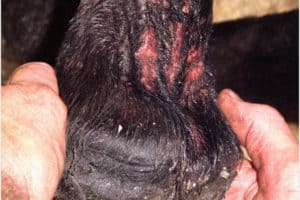Latest News – The Horse
Horse Trust Takes in Retired Police Horse
The Horse Trust has reopened the doors of its sanctuary, thanks to an increase in donations from the public. The first horse to benefit from this is Weller, a Greater Manchester Police (GMP) horse who has retired to the sanctuary after 14 years of service.
In 2009, The Horse Trust temporarily closed its doors to new horses–apart from emergency welfare cases–due to a drop in publ
Common Castration Complications (AAEP 2009)
Complications associated with equine castrations occur commonly and should be identified and treated properly in the field. A “Review of castration complications: Strategies for treatment in the field” was presented at the American Association of Equine Practitioners Convention.
Sepsis Treatment in Horses, AAEP 2009
Sepsis is a systemic inflammatory response syndrome (SIRS) in which the whole body is in an inflammatory state due to the presence of a known or suspect bacterial infection. The evolution and future of sepsis treatment in the horse was described by Pamela Wilkins, DVM, PhD, Dipl. ACVIM, ACVECC, at the 2009 American Association of Equine Practitioners (AAEP) convention, held Dec. 5-9 in Las V
Dr. Kari De Leeuw on Acupuncture: Horse Tip Daily #130
We are very excited to have Dr. De Leeuw on the Horse Tip Daily Show with us. Dr. De Leeuw is a Veterinarian with a
John Da Silva on the Horse’s Temperature: Horse Tip Daily #131
John Da Silva of ECOGOLD joins us to speak about the importance of your horse’s temperature during work, listen in … Horse Tip Daily #131
Surely Awesome Part 4: Waiting, worrying
On Thursday in this excerpt from the book Equine ER, Surely Awesome went to surgery. Dr. Al Ruggles’ goal was to repair the mare’s shattered

Horse Protection Act (AAEP 2009)
Dr. Rachel Cezar of the USDA APHIS talks about the Horse Protection Act. (4:38)

Conditioning horses with DSLD (AAEP 2009)
Lin Xie, a student at Louisiana State University, discusses conditioning horses with degenerative suspensory ligament desmitis. (2:42)
Dressage Star Blue Hors Matine Euthanized
Dressage mare Blue Hors Matine, whose dressage freestyle at the 2006 World Equestrian Games in Aachen became an Internet video sensation, was euthanized today after breaking a leg in a paddock accident, Horse and Hound reported.
The 13-year-old Dutch mare was ridden by Andreas Helgstrand. She was retired from competition following a tendon injury at the Las Vegas World Cup in 2007.
Jail Sentence for California Horse Cruelty Family
The California family convicted on multiple animal cruelty charges connected to the removal of 100 horses from their Frazier Park ranch will serve jail time and are prohibited from owning horses for five years.
Jane Bor, her son Ernie, and daughter-in-law Cecelia were arrested in October 2008 after authorities removed
Cortisol Levels and Colic Survival in Horses (AAEP 2009)
Cortisol, which is often termed the “stress hormone” because its levels rise in response to stress in horses and other species, might offer veterinarians another tool for assessing and developing prognoses for horses with colic. One study examined cortisol levels in 29 colicking horses referred to a United Kingdom clinic for exploratory surgery.
Humane Society Group Arrives in Haiti
After arriving in Haiti Thursday evening, a team of veterinarians has begun to assess animal needs and is offering hands-on assistance to animals affected by the earthquake. The group represents Humane Society International, The Humane Society of the United States, and the Humane Society Veterinary Medical Association.
“Our team is committed to assisting the animals of this d
Vets Join Haiti Animal Relief Coalition
The American Veterinary Medical Association (AVMA) and American Veterinary Medical Foundation have joined a coalition of other animal health and welfare groups to help address the ongoing humanitarian relief efforts in Haiti following the January 12 earthquake that devastated the country.
The Animal Relief Coalition of Haiti (ARCH) was developed by the Read More

Bayer Animal Health (AAEP 2009 Tradeshow)
Dr. Scott King of Bayer announces the winners of the AAEP Resort meeting contest and what’s new for Bayer in 2010.
Alberta Wild Horse Shooting Arrests Made
Law enforcement authorities have arrested two men and a 13-year-old boy in connection with the shooting of a pregnant mare near Sundre, Alberta, last year.
Jason Nixon, 29, and Earl Anderson, 40, both from the Sundre area, have been charged with killing cattle and careless use of a firearm. More than 30 wild horses have been shot in the area since 2002.
Improving Peritonitis Treatment in Horses, AAEP 2009
Peritonitis, defined as inflammation of the peritoneum (membrane lining the abdomen), can result from many problems, from disease to infection following injury or colic/colic surgery. Regardless of the cause, a common treatment is lavage (flushing) of the abdomen after the primary cause of the peritonitis is handled. Many liters of fluid are used to lavage a horse’s abdomen, and of course you have











